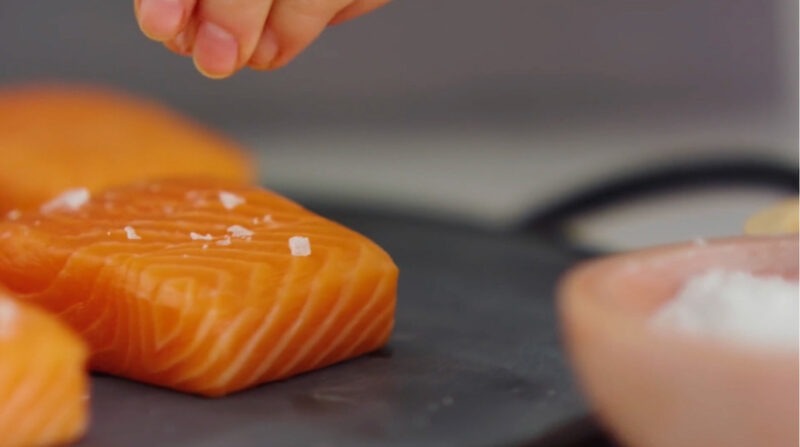Netflix series loaded with misinformation about farmed salmon
Global Salmon Initiative (GSI) states new Netflix series lacks factual and balanced information that helps people make educated decisions about seafood, aquaculture, and their health.
By SeaWestNews
Netflix’s new pro-vegan series – “You Are What You Eat: A Twin Experiment” – stands in stark contrast to the abundant scientific evidence and global consensus among nutrition experts who recommend both wild and farmed seafood, states the Global Salmon Initiative (GSI).
Representing approximately 40% of the global farmed salmon sector, GSI said it is disappointed to see the show lacked the type of holistic, factual and balanced information that helps people make educated decisions about their health.
The series highlighted the broad impacts of diet on health, climate and social issues, but it asserted a pro-vegan bias, claiming to be educational yet lacking in scientific rigor and key details, said GSI.
“What’s more, when it comes to the segment on farmed salmon, the research publication the series is based on does not draw any specific conclusions related to seafood and contains no mentions of salmon, farmed or wild. Yet episode three of the series included unsubstantiated criticisms of farmed salmon.”
The four-part documentary series explored linkages between diet, genetics and health by studying four sets of identical twins over an eight-week period. In that time, one twin ate a “healthy” vegan diet, while the other ate a “healthy” omnivore diet.
Here’s a little more about the limitations of the series – and three facts to consider about the misinformation it included about farmed salmon, according to GSI.
Is farmed salmon higher in fat than wild salmon?
No. Farmed salmon has a similar nutrient profile as wild salmon. Research published in 2023 reaffirmed that there is no consistent difference in the health benefits of wild or farmed salmon and that both provide valuable nutrients.
Fat content for salmon can differ by species – whether farmed or wild – as well as other factors such as the type of feed consumed or the time of year when wild salmon is caught.
However, both farmed and wild salmon are recognized by global authorities and nutrition experts for providing high-quality protein, healthy fats (e.g., omega-3 fatty acids) and essential vitamins like vitamins D and B-12. Which is why global health bodies recommend eating two portions of seafood, including farmed salmon a week to get your recommended intake of nutrients.
Does farmed salmon have more contaminants than wild salmon?
No. In fact, research from 2020 shows farmed salmon is lower in dioxins and has far less exposure to PCBs and dioxins than wild salmon. Experts have routinely and recently noted that the benefits of eating fish outweigh the potential risks from exposure to contaminants.
If you’re not familiar with PCBs (or polychlorinated biphenyls), they’re human-made chemical compounds that linger in the environment and can build up in the food chain. If there are PCBs present in salmon’s environment or in the smaller fish they eat, then the salmon – wild or farmed – will be exposed to PCBs.
However, farmed salmon has lower contaminant levels because of the careful consideration of their diets. This includes the increased use of plant-based ingredients in farmed salmon feed and the reduced use of fish oil, which historically was the primary source of PCBs in farmed salmon.
In other words, you can feel good about your farmed salmon – it’s a safe and healthy choice.
Do farmers use dye to give farmed salmon its pink/red color?
No. Farmed salmon gets its color from astaxanthin, an important carotenoid and antioxidant found in the diets of both wild and farmed salmon. Astaxanthin is an essential part of salmon’s diet in the wild, so it is added to farmed salmon feed for the nutritional benefits it provides.
Astaxanthin must be listed as a colorant in farmed salmon because it does impact the color of the fish. (Much like flamingos, which get their color from the carotenoids in algae, crustaceans and other organisms they eat.)
Not only is astaxanthin safe, but it is also widely available as a supplement to support human health. It offers a range of benefits from exercise recovery to collagen and skin health – and, if you eat whole foods with astaxanthin, like farmed salmon, you can skip the trip to the health food store.
(Image courtesy of Mowi)

